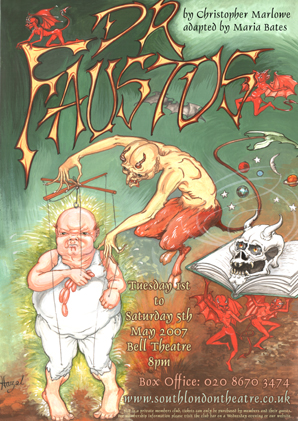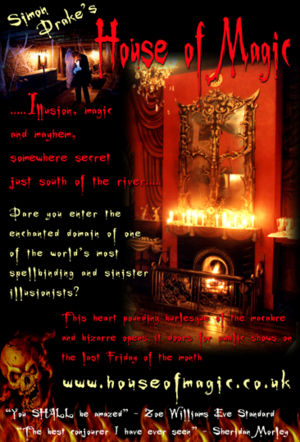Difference between revisions of "Dr Faustus (2007)"
Maria Bates (Talk | contribs) (→Gallery) |
Maria Bates (Talk | contribs) (→Gallery) |
||
| Line 160: | Line 160: | ||
Image:Faust2.jpg|[[Andy Davies]] | Image:Faust2.jpg|[[Andy Davies]] | ||
Image:Faust3.jpg|[[Ed Cartwright]] | Image:Faust3.jpg|[[Ed Cartwright]] | ||
| − | Image:Faust4.jpg|[[ | + | Image:Faust4.jpg|[[Helen Chadney]] |
| − | Image:Faust5.jpg|[[ | + | Image:Faust5.jpg|[[Michelle Thomson]] |
Image:Faust6.jpg|[[]] | Image:Faust6.jpg|[[]] | ||
Image:Faust7.jpg|[[]] and [[]] | Image:Faust7.jpg|[[]] and [[]] | ||
Revision as of 11:32, 24 May 2007

by Christopher Marlowe, adapted by Maria Bates
Directed by Maria Bates
Performances: Tue 1st – Sat 5th May 2007, Bell Theatre
Contents
Introduction
“Nothing so sweet as magic is to him, which he prefers before his chiefest bliss. And this the man that in his study sits”
Welcome to the land of illusion, a place in the mind, a shimmering mirage of riches and mystery and death. Within the walls of Faust’s opulent gothic mansion an orgy of evil is about to begin.
Profane, irreverent and sexy yet daring to make you ponder philosophical arguments that have troubled Man since the beginning of time. God, freewill and the everlasting torments of Hell! A macabre burlesque of mad magic, visual mayhem, pole dancing devils, sword fighting angels, blood, fire and crazy puppets. Expect the unexpected!
The director, cast and crew would like to offer special thanks to Simon Drake and his House Of Magic team for their invaluable help and support with this production.
To find out more about Simon Drakes's spectacular House Of Magic and book tickets for his show visit: Simon Drakes's House Of Magic
Cast
- Dr Faustus - Ed Cartwright
- Female Mephistophilis - Helen Chadney
- Male Mephistophilis - Andy Davies
- Good Angel - Caroline Doyle
- Evil Angel - Catherine Ellis
- Horse Courser/Pope/Puppeteer - David Ewings
- Emperor/Puppeteer - Alan Buckman
- Duke/Puppeteer - James Hough
- High Priestess/poi - Michelle Thomson
Crew
- Assistant Director - David Lomas
- Stage Manager - Graham Clements
- Lighting Design - Stuart Draper and Neil Carmichael
- Lighting Operator - Christian Murphy
- Assistant Stage Manager - Lauri Morgan
- Composer and Sound Engineer - Gerard Johnson
- Set construction - Graham Clements, Matthew Lyne, Mike Elliott and the cast and crew
- Choreography - Juliette Stark
- Costumes - Michelle Thomson
- Magic Consultant - Simon Drake
Programme Notes
Faustus:
Doctor, philosopher and theologian, Faustus is lonely and isolated, a man whose intelligence is unrivalled yet he finds it difficult and almost pointless to communicate with others, therefore he surrounds himself with books instead of friends.
He lives in an opulent Gothic mansion but inhabits just one room.
Fiercely proud, able to cure plague, a master of words and philosophy, yet still he cannot find the things he really craves: love and companionship. Almost suicidal, he embarks on a path of self-destruction.
Obsessed with necromancy and the dark arts he experiments, using his soul as the currency to investigate if there's anything else worth living for.
A self-induced mania begins, akin to the adrenaline rush of driving a fast car with reckless intent. Taking each corner faster and faster, seeing how close to the edge he can push, before the inevitable crash and burn.
The Adaptation:
If freedom is man’s greatest gift then why are we taught that God owns all in man that is everlasting?
At first it seems paradoxical that Marlowe, a man arrested for being an atheist, should create a play whose central character wrestles with God and the Devil.
How much would you sell your soul for?
Is it possible to ponder this question without considering whether you know which currency you are dealing in or if you even have anything worthwhile to sell?
Possibly the play is about a man rejecting any notion of there being an afterlife or a reality other than the one he currently lives and breathes.
Faustus is tormented because he is unable to delude himself about his own mortality in the way his peers, the church and the law of the land at the time demand of him.
Could this be how Marlowe felt himself?
God seems to offer Faustus everything he could want tomorrow if he is able to love and trust in him exclusively today but Faustus believes that tomorrow will never come. The Devil (or his addiction) offers him everything he wants today so that he can forget about tomorrow. It is no great surprise then, that he chooses the option of selling his soul.
Faustus' personal journey, and how an audience may differ in their perception of his final damnation according to their own religious beliefs, also provides another source of interest.
Our adaptation sets out to explore these aspects of the play, together with the idea of illusion and delusion being omnipresent in everyone's lives.
How many of us spend time deluding ourselves with the fantasy of what might be rather than seeing exactly what we have?
To look at conflict within the enigmatic figure of Mephistophilis and to allow this seductively flexible spirit to assume more than one form, we have chosen to split his role in two. Both actors are Mephistophilis but they represent differing sides of the fallen angel; doubt and certainty, repentance and resolution, desperation and cold resolve.
The idea of Mephistophilis being a fallen Angel also threw up many questions for us:
How does the Good Angel feel about the fall of Mephistophilis?
How does Mephistophilis feel about his fall? Does Mephistophilis ever want to repent or is he simply content collecting souls? Could this be the dichotomy that has split his soul in two?
How close was the Good Angel herself to falling?
What exactly are the pains of damnation and how could an all-loving God allow any soul to suffer them?
We hope our audience will attempt to answer these questions for themselves, in their own minds, with their own demons, own angels and own hopes to guide them.
As a director it has been a tremendous pleasure to work with such an intelligent and dedicated cast and a backstage team with so many amazing talents from scenic art to lighting design, that have helped to bring our ideas to the stage and have made this a real ensemble piece.
Reviews
I’m ashamed to say that last week’s production of Dr Faustus was the first thing I’ve seen at West Norwood’s South London Theatre (SLT), writes Mark Campbell.
But judging by the creative energy on offer, it definitely won’t be the last.
Christopher Marlowe’s version of the German legend was adapted and directed by talented SLT member Maria Bates, with portions of the drier material pared down and some fascinating new twists added.
Ed Cartwright’s foppish, Hugh Grant-like Dr Faustus begins as an almost androgynous figure perched alone in his gloomy Gothic study, surrounded by all the accoutrements of the Black Arts.
He is visited by a sexually alluring male and female Mephostophilis, both dressed in black leather, who offer him the chance to have every desire fulfilled providing he sells his soul to the Devil.
His descent into madness is accompanied by all manner of ingenious theatre tricks, courtesy of professional magician Simon Drake. The demonstration of the Seven Deadly Sins, for example, was brilliantly depicted.
As the female tempter, the velvety voiced Helen Chadney was voluptuously sexy. Andy Davies as her male alter ego was less obviously carnal but still swaggeringly louche in his long, black coat.
Michelle Thomson, the provocative High Priestess, shared lesbian kisses with Helen Chadney, while Catherine Ellis in PVC basque and high heels camped up the role of the Evil Angel, opposite Caroline Doyle’s demure, pre-Raphaelite Good Angel.
Faustus’ Gothic room, designed by Maria Bates and Alan Buckman and beautifully painted by Hazel Hindle, was as stunning as a Georges Méliès silent film set, with excellent use made of props, furniture and dressing.
Special mention must go to Gerard Johnson’s circus-inspired electronic music, written specifically for the performance. Together with his inventive lighting effects, this made a huge contribution to the burlesque atmosphere of the show.
Bondage, S&M, fetishism, lesbianism, grotesque puppetry and full frontal male nudity - it was all here; although none of it ever felt gratuitous.
Dr Faustus was a sexy and scary magical treat that astonished, amused and entertained in equal measure. Unmissable.
Mark Campbell (Bromley Times)
.............................................................................................
DIRECTOR Maria Bates' version of Dr Faustus sparkled and this was the best amateur production I have seen this year.
It had a great Gothic-looking set which was eerily lit, and a variety of sound effects and props which never missed a cue.
This cautionary tale is about a man who sells his soul to the devil. Not a cheerful thought but haven't we all done so at some time? The play's message comes across clearly, and the fun that is had at the expense of the Pope among others still amuses.
I liked the concept of a male and female Mephistopheles, the former suavely played by Andy Davies and the latter by the silky and voluptuous Helen Chadney.
David Ewings was an excellent Horse Courser with the 'begorrah' of an accent but perhaps too shrill as the Pope.
Caroline Doyle had the difficult part of making purity attractive as the good angel and Catherine Ellis made the most of her role as the opposite number.
Ed Cartwright was simply superb as Faustus with his acting ranging from comedy to horror as the prospect of eternal damnation loomed before him.
Peter Steptoe (Croydon Advertiser)
Gallery
- Photos by Christopher Vian Smith
Reminiscences and Anecdotes
Members are encouraged to write about their experiences of working on or seeing this production. Please leave your name. Anonymous entries may be deleted.
See Also
Have there been other SLT productions of this play? Link to them here.
Or add anything that is related within this site. The author's page for instance or other plays with a similar theme.












